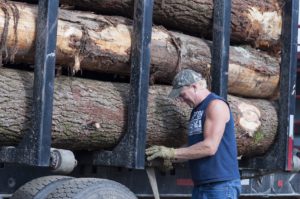Vermont’s Forest Products Industry: In Transition and Hopeful for the Future
Vermont prides itself as the Green Mountain State, with nearly 80-percent of its land mass covered in forest. Healthy and productive forests are inherent to Vermont’s culture and heritage. Yet, the industry responsible for bringing us countless valuable forest products: high quality furniture, specialty wood crafts, lumber and firewood, as well as services such as clean water, fresh air and a home for wildlife—is in decline due to a myriad of challenges. Rapidly changing commodity markets, overseas competition, and an aging workforce all are contributing to an industry in transition. And yet, both the environmental and economic viability of Vermont’s forested landscape depends on a healthy forest products industry to responsibly manage, harvest, and utilize Vermont’s forests.
Vermont’s forest products industry generates an annual economic output of $1.5 billion and supports 10,000 jobs in forestry, logging, processing, specialty woodworking, construction, and wood heating. In addition, Vermont’s forest recreation economy generates another $1.9 billion in economic output, and supports 10,000 additional jobs. While Vermont’s forests supply high quality saw logs used in construction or by specialty woodworkers, the majority of wood presently in our forests is considered ‘low grade,’ typically used for pulp to make paper or chipped for heat or electricity. And due to a sharp decline in the region’s pulp industry, combined with the low price of oil and a move away from expanding electric-only biomass in the region, the market for low-grade wood has substantially dried up.
So, while markets for high quality wood are healthy, they cannot singularly sustain Vermont’s forest products industry. Without healthy markets for low grade wood, Vermont is likely to see continued decline in the industry’s in-state infrastructure such as logging operations, sawmills and kilns, as well as the local jobs they sustained and the forest management service they provide.
Hope for the Future
Despite what sometimes sounds like a gloomy forecast for this industry in transition, I see hope for the future. Within the forest products industry are entrepreneurs developing new and innovative wood products and business models, logging and forestry professionals with impressive knowledge of and dedication to Vermont’s forest health and productivity, and talented woodworkers whose craftsmanship bolsters Vermont’s reputation for fostering creativity.
According to the 2016 Forest Sector Systems Analysis, commissioned by the Vermont Working Lands Enterprise Board both protecting our forests and strengthening the entire industry are equally critical for Vermont’s economic and ecological future. Finding markets for low-grade wood, product innovation, workforce development, technical and business assistance, and financing were identified as major issues impacting the forest products sector. The analysis identified the need for network development and value chain facilitation to sustainably develop Vermont’s forest economy. This led to the creation of the Vermont Forest Products Program, coordinated by the Vermont Sustainable Jobs Fund in collaboration with the Vermont Working Lands Enterprise Initiative and the Northern Forest Center.
Network development accelerates industry growth by bringing together diverse stakeholders to tackle systems level change no one business or organization can do alone. Modeled after the successful Farm to Plate Network, a new Forest Industry Network will create the space for industry professionals from across the entire supply chain and trade association partners throughout the state to build stronger relationships and collaboration throughout the industry, including helping to promote new and existing markets for Vermont wood products, from high quality furniture to construction material to thermal biomass products such as chips and pellets.
Value chain facilitation builds teams of private sector stakeholders, along with service and capital providers, to address bottlenecks in existing supply chains and/or to take advantage of emerging market opportunities for specific products or services. Value chain action teams in the Vermont Forest Industry Network are comprised of members with knowledge or expertise from throughout the forest products supply chain and are working to advance the development of specific products including: mass timber, automated wood heat, and locally sourced wood products.
Creating and retaining quality jobs for Vermonters, opening additional markets for locally produced wood products, and improving economic development in the forest products industry, all while benefiting the environment, is achievable and the work has begun. Learn more or join the Vermont Forest Industry Network at www.vsjf.org.


